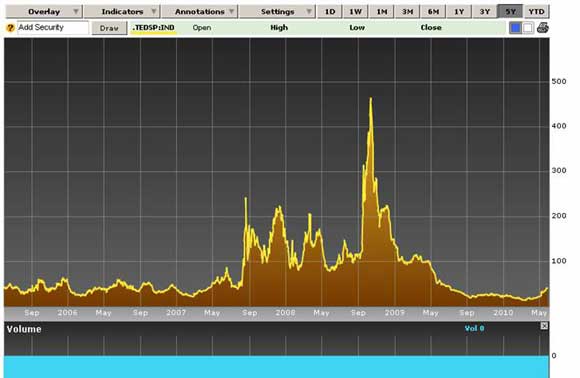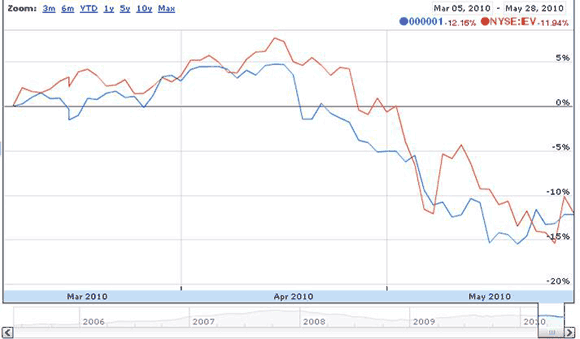I see many financial commentators bravely trying to explain recent ups and downs in asset and commodity prices in terms of news coming out of Europe. But a Eurocentric perspective misses an important part of the story.
My primary concern about the situation in Europe has been that as the probability of default in one country increases, that can increase the risk premium on sovereign debt for other countries as well. Rising interest costs could then force those other countries to restructure their debt. The falling dominos would undermine the net worth of banks that extended the sovereign loans, hindering the banks’ access to short-term credit and their ability in turn to fund private-sector loans in a potential replay of the events of 2008.
The excess in the 3-month LIBOR bank borrowing cost over the 3-month T-bill rate, known as the TED spread, would be one potential indicator of such concerns. This has risen to new highs for 2010, but is still far below the values we saw in 2007-2009.

TED spread (3-month LIBOR minus 3-month U.S. T-bill rates). Source: Bloomberg
One fact that seems difficult to reconcile with a purely Eurocentric interpretation of recent developments is the behavior of the Chinese stock market, whose decline in percentage terms has been about the same as that in Europe. Does it really make sense to interpret this drop on the Shanghai Stock Exchange solely as a reaction to developments in Europe?

Blue: SSE Shanghai Stock Exchange composite stock price index. Red: IEV S&P Europe 350 stock price index. Source: Google Finance.
Prices of stocks, property, and commodities in China had been looking rather bubbly to many observers. In some models of price bubbles, what keeps the appreciation going is everybody’s belief that everybody else believes it will keep going. If that describes the situation, worries that started in Europe could prove to be a mechanism to coordinate the inevitable revision to expectations. In any case, a growing resolve by the Chinese government to try to discourage asset price appreciation has coincided with the news about Europe on which many observers are focused. Bloomberg reports that recent tightening measures in China include:
reining in loans for purchases of multiple homes, increasing mortgage rates and raising down payment requirements. The central bank ordered lenders this month to set aside more deposits as reserves for a third time in 2010.
There is also discussion of a plan to introduce a new property tax in selected Chinese cities on a trial basis. If there is a bubble component to current property values, that could be a pretty sharp pin.
Europe isn’t the only drama to be keeping an eye on.
- Bulenox: Get 45% to 91% OFF ... Use Discount Code: UNO
- Risk Our Money Not Yours | Get 50% to 90% OFF ... Use Discount Code: MMBVBKSM
Disclaimer: This page contains affiliate links. If you choose to make a purchase after clicking a link, we may receive a commission at no additional cost to you. Thank you for your support!



Leave a Reply